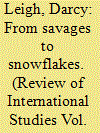| Srl | Item |
| 1 |
ID:
192013


|
|
|
|
|
| Summary/Abstract |
Right-wing free speech advocacy is increasingly shaping global politics. In IR, free speech has generally been viewed within human rights and international legal frameworks. However, this article shows that contemporary free speech advocates often ignore or oppose human rights and international law, focusing instead on (what they describe as) a defence of the nation state against the enemies of free speech. This article examines this articulation of free speech's enemies: first historically as the ‘savage’ in John Stuart Mill's influential formulation of free speech; and then contemporarily as the ‘snowflake’, ‘mob’, and ‘cultural Marxist’ by elected officials and lobbyists in the UK and US. The article argues that John Stuart Mill's savage is figured within a racialised civilisational hierarchy of degrees of humanity. Today, right-wing free speech advocates extend and reconfigure this hierarchy, imagining the ‘snowflake’, ‘mob’, and ‘cultural Marxist’ as lesser human, subhuman, and extra-human, respectively. Thus, in contrast to rights-based analyses of free speech advocacy – which assume or assess the promotion of rights as a ‘public good’ – the article argues that narratives of free speech's enemies are deployed by right-wing free speech advocates to underwrite racialised policy responses and global hierarchies.
|
|
|
|
|
|
|
|
|
|
|
|
|
|
|
|
| 2 |
ID:
175165


|
|
|
|
|
| Summary/Abstract |
In what ways has migration as a field of scholarship contributed to the discipline of International Relations (IR)? How can migration as a lived experience shed light on international politics as a field of interconnections? And how might migration as a political and analytical force compel IR to confront its privileged subjects? This article addresses these questions by focusing specifically on precarious migration from the Global South to the Global North. It shows how critical scholars refuse the suggestion that such migrations pose a ‘global challenge’ or problem to be resolved, considering instead how contemporary practices of governing migration effectively produce precarity for many people on the move. It also shows how critical works point to longer standing racialised dynamics of colonial violence within which such governing practices are embedded, to emphasise both the limitations of liberal humanitarianism as well as the problematic politics of ‘the human’ that this involves. By building on the insights of anti-racist, indigenous and postcolonial scholarship, critical scholars of migration are well placed to draw attention to the privileging of some subjects over others in the study and practice of international politics. The article argues that engaging IR while rejecting the orthodoxies on which the discipline is built remains critical for such works in order to advance understanding of the silences and violences of contemporary international politics.
|
|
|
|
|
|
|
|
|
|
|
|
|
|
|
|